| Listing 1 - 10 of 77 | << page >> |
Sort by
|
Book
ISBN: 0198146809 Year: 1990 Publisher: Oxford Clarendon
Abstract | Keywords | Export | Availability | Bookmark
 Loading...
Loading...Choose an application
- Reference Manager
- EndNote
- RefWorks (Direct export to RefWorks)
Classical Greek literature --- 875-13 --- 875-14 --- 875-21 --- Greek drama (Tragedy) --- -Greek literature --- -Balkan literature --- Byzantine literature --- Classical literature --- Classical philology --- Greek philology --- Griekse literatuur: epiek --- Griekse literatuur: lyriek; minnezang; religieuze poëzie; lied --- Griekse literatuur: tragedie --- History and criticism --- -Griekse literatuur: epiek --- 875-21 Griekse literatuur: tragedie --- 875-14 Griekse literatuur: lyriek; minnezang; religieuze poëzie; lied --- 875-13 Griekse literatuur: epiek --- -875-21 Griekse literatuur: tragedie --- Greek literature
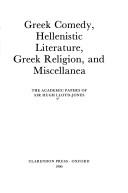
ISBN: 0198147457 Year: 1990 Publisher: Oxford Clarendon
Abstract | Keywords | Export | Availability | Bookmark
 Loading...
Loading...Choose an application
- Reference Manager
- EndNote
- RefWorks (Direct export to RefWorks)
History of civilization --- Classical Greek literature --- Greece --- 875-22 --- Greek drama (Comedy) --- -Greek literature, Hellenistic --- -Hellenistic Greek literature --- Griekse literatuur: comedie --- History and criticism --- Civilization. --- -Griekse literatuur: comedie --- 875-22 Griekse literatuur: comedie --- -875-22 Griekse literatuur: comedie --- Hellenistic Greek literature --- Greek literature, Hellenistic
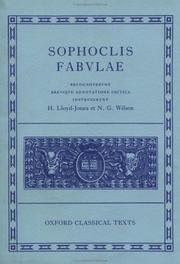
ISBN: 0198145772 9780198145776 Year: 1990 Publisher: Oxford: Clarendon,
Abstract | Keywords | Export | Availability | Bookmark
 Loading...
Loading...Choose an application
- Reference Manager
- EndNote
- RefWorks (Direct export to RefWorks)
Mythology, Greek --- Mythologie grecque --- Drama --- Théâtre --- Drama. --- -Greek mythology --- -Drama --- Théâtre --- Classical Greek literature --- Mythology, Greek - Drama.
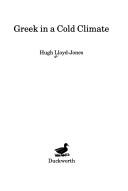
ISBN: 0715623583 Year: 1991 Publisher: London : Duckworth,
Abstract | Keywords | Export | Availability | Bookmark
 Loading...
Loading...Choose an application
- Reference Manager
- EndNote
- RefWorks (Direct export to RefWorks)
Civilization, Ancient --- Greek philology --- Civilisation ancienne --- Philologie grecque --- Greece --- Grèce --- Civilization --- Civilisation --- Greek literature --- History --- Grèce
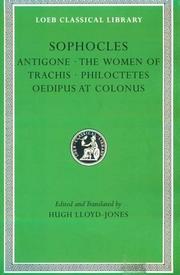
ISBN: 0674995570 0674995589 0674995325 9780674995581 9780674995321 9780674995574 Year: 1996 Volume: 20-21, 483 Publisher: Cambridge (Mass.): Harvard university press,
Abstract | Keywords | Export | Availability | Bookmark
 Loading...
Loading...Choose an application
- Reference Manager
- EndNote
- RefWorks (Direct export to RefWorks)
Sophocles (497/6-406 BCE), with Aeschylus and Euripides, was one of the three great tragic poets of Athens, and is considered one of the world's greatest poets. The subjects of his plays were drawn from mythology and legend. Each play contains at least one heroic figure, a character whose strength, courage, or intelligence exceeds the human norm-but who also has more than ordinary pride and self-assurance. These qualities combine to lead to a tragic end. Hugh Lloyd-Jones gives us, in two volumes, a new translation of the seven surviving plays. Volume I contains Oedipus Tyrannus (which tells the famous Oedipus story), Ajax (a heroic tragedy of wounded self-esteem), and Electra (the story of siblings who seek revenge on their mother and her lover for killing their father). Volume II contains Oedipus at Colonus (the climax of the fallen hero's life), Antigone (a conflict between public authority and an individual woman's conscience), The Women of Trachis (a fatal attempt by Heracles' wife to regain her husband's love), and Philoctetes (Odysseus's intrigue to bring an unwilling hero to the Trojan War). Of his other plays, only fragments remain; but from these much can be learned about Sophocles' language and dramatic art. The major fragments-ranging in length from two lines to a very substantial portion of the satyr play The Searchers-are collected in Volume III of this edition. In prefatory notes Lloyd-Jones provides frameworks for the fragments of known plays.
Greek drama (Tragedy) --- Mythology, Greek --- Tragédie grecque --- Mythologie grecque --- Translations into English --- Drama --- Traductions anglaises --- Théâtre --- Sophocles --- Traductions en anglais --- Drama. --- -Greek mythology --- Translations into English. --- Sofokles --- Sophocle --- Sofocle --- Sophokles --- Sofocles --- Classical Greek literature --- Tragédie grecque --- Théâtre --- Sophocle, --- Mythology, Greek - Drama. --- -Drama --- History and criticism. --- Greece --- Trojan War
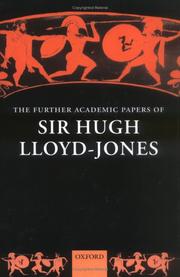
ISBN: 0199279322 9780199279326 0191706884 Year: 2005 Publisher: Oxford : Oxford University Press,
Abstract | Keywords | Export | Availability | Bookmark
 Loading...
Loading...Choose an application
- Reference Manager
- EndNote
- RefWorks (Direct export to RefWorks)
This third volume completes the author's collected Academic Papers. The subject areas covered reflect Lloyd-Jones's wide interests as a classical scholar including Greek epic, tragedy comedy, literature and religion.
Book
ISBN: 0520017390 9780520017399 Year: 1973 Volume: v. 41 Publisher: Berkeley (Calif.): University of California press,
Abstract | Keywords | Export | Availability | Bookmark
 Loading...
Loading...Choose an application
- Reference Manager
- EndNote
- RefWorks (Direct export to RefWorks)
Dikē (The Greek word) --- Religion and justice --- History --- Zeus --- Greece --- Religion --- Religion. --- Zeus (Greek religion) --- Dika (The Greek word) --- Dike (The Greek word) --- Zeus (Greek deity) --- Dikē (The Greek word) --- Dikē (The Greek word). --- Dikē (The Greek word). --- Zeus (Greek deity). --- Dikā (The Greek word) --- Justice and religion --- Justice --- Greek language --- Etymology --- History. --- Aspect religieux --- Histoire --- Grèce --- Religion and justice - History --- Zeus - (Greek deity) --- Greece - Religion
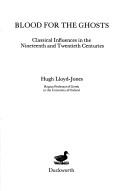
ISBN: 0715615009 Year: 1982 Publisher: London Duckworth
Abstract | Keywords | Export | Availability | Bookmark
 Loading...
Loading...Choose an application
- Reference Manager
- EndNote
- RefWorks (Direct export to RefWorks)
930.85 --- Greek literature --- -Balkan literature --- Byzantine literature --- Classical literature --- Classical philology --- Greek philology --- Cultuurgeschiedenis. Kultuurgeschiedenis --- History and criticism --- Europe --- Council of Europe countries --- Eastern Hemisphere --- Eurasia --- Civilization --- -Greek influences. --- Intellectual life. --- -Cultuurgeschiedenis. Kultuurgeschiedenis --- 930.85 Cultuurgeschiedenis. Kultuurgeschiedenis --- -930.85 Cultuurgeschiedenis. Kultuurgeschiedenis --- Greece --- Greek influences.
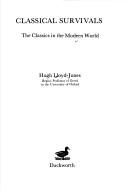
ISBN: 0715615173 Year: 1988 Publisher: London : Gerald Duckworth,
Abstract | Keywords | Export | Availability | Bookmark
 Loading...
Loading...Choose an application
- Reference Manager
- EndNote
- RefWorks (Direct export to RefWorks)
Civilization, Classical --- Classical philology --- Philology, Classical --- Classical antiquities --- Greek language --- Greek literature --- Greek philology --- Humanism --- Latin language --- Latin literature --- Latin philology --- Classical civilization --- Civilization, Ancient --- Classicism --- Greece --- Rome --- Historiography.
Book
ISBN: 0715613707 0715613715 Year: 1979 Publisher: London : Duckworth,
Abstract | Keywords | Export | Availability | Bookmark
 Loading...
Loading...Choose an application
- Reference Manager
- EndNote
- RefWorks (Direct export to RefWorks)
| Listing 1 - 10 of 77 | << page >> |
Sort by
|

 Search
Search Feedback
Feedback About UniCat
About UniCat  Help
Help News
News